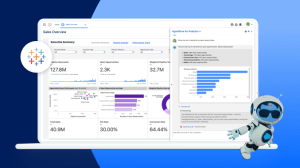Salesforce Study: 91% of Singapore Technical Leaders See Data Overhaul as Critical for AI Strategies to Succeed

New Salesforce research reveals a disconnect between data ambitions and execution, even as expanding AI capabilities rise to the top business priority in Singapore
SINGAPORE — November 20, 2025 – Salesforce (NYSE: CRM), the #1 AI CRM, today announced its latest State of Data and Analytics report, sharing insights from 3,800 analytics and IT decision makers and over 3,800 business leaders, including 200 from Singapore. The survey revealed a fundamental disconnect between businesses’ data demands and their data reality, which can hinder their progress toward becoming agentic enterprises.
77% of business leaders in Singapore say they’re under growing pressure to drive business value with data. While business leaders are eager to use AI for insights and productivity, their technical counterparts worry a new approach to data and analytics is needed. In fact, 91% of data and analytics leaders in Singapore say their data strategies need a complete overhaul before their AI ambitions can succeed.
To close the gap, savvy technical leaders are focusing on the fundamentals: timely, context-rich data, stronger governance and zero copy architectures that unlock trapped, distributed data regardless of where it resides. On their journey to becoming agentic enterprises, they’re also embracing emerging solutions like agentic analytics that bring reliable insights into the flow of work.
“Agentic AI is the most powerful enabler of business transformation today, ushering unprecedented productivity, customer connection and growth. Yet, fragmented data and inconsistent governance continue to hold organisations back from realising the technology’s full potential, and fulfilling their vision of becoming agentic enterprises,” said Gavin Barfield, Vice President & Chief Technology Officer, Solutions, ASEAN, Salesforce. “Singapore organisations facing mounting pressure to expand their AI capabilities must first get their data foundation in order. Unifying disparate data, and building robust governance will be critical to unlocking real business value from AI.”
Key data from the report:
Existing data foundations struggle to support business ambitions
More than half (54%) of business leaders in Singapore describe their organisations as data-driven. Yet nearly two-thirds (63%) of data and analytics leaders say their companies struggle to drive business priorities with data, exposing a gap between data maturity perceptions and reality.
- Less than half (46%) of business leaders in Singapore say they can reliably generate timely insights.
- Over half (59%) of data and analytics leaders in Singapore say their companies occasionally or even frequently draw incorrect conclusions from data with poor business context.
Poor data derails path to becoming an agentic enterprise
AI has quickly become the top data priority — and the biggest stress test for existing data foundations. In 2023’s State of Data and Analytics report, expanding AI capabilities rose from the #10 priority among Singapore respondents in 2023 to the #1 priority this year.
- As a result, 86% of data and analytics leaders in Singapore feel pressured to implement AI quickly.
- Yet, 36% aren’t fully confident in the accuracy and relevance of their AI outputs, likely because of the disconnected, out-of-date data it draws from.
- While 88% of data and analytics leaders theoretically agree that AI’s outputs are only as good as its data inputs, their reality is a bit more complicated. Data and analytics leaders estimate that over a quarter (27%) of their organisational data is untrustworthy.
Businesses are feeling the consequences of training AI on faulty data foundations
- 84% of data and analytics leaders in Singapore with AI in production say they’ve experienced inaccurate or misleading AI outputs.
- Nearly two-thirds of Singapore data and analytics leaders (66%) at companies training or fine-tuning their own models report they’ve wasted significant resources doing so with bad data.
“Agentic AI isn’t the next technology — it’s the next revolution. AI agents handle routine tasks so humans can focus on creativity, relationships, and impact,” announced Salesforce CEO Marc Benioff in his Dreamforce keynote. However, he warned that “to truly get the most value and context from AI models, you’ve got to get your data right. You have to get to more integrated solutions. You have to get the priorities right. You have to get the governance right.“
Even high-quality data is useless if it’s trapped
9 in 10 data and analytics leaders believe unified data is key to meeting customer expectations. At the same time, concerns over siloed or trapped data have skyrocketed globally. The issue is exacerbated by application sprawl: the average enterprise uses 897 applications, and only 29% are connected. This severe fragmentation scatters data across silos, making it difficult or impossible to access. As a result:
- Data and analytics leaders in Singapore estimate that 21% of their company’s data is siloed, inaccessible, or otherwise unusable.
- More concerning, 78% of data and analytics leaders in Singapore believe their most valuable business insights reside within this inaccessible 21%.
- The ramifications are widespread, with over 7 in 10 data and analytics leaders in Singapore citing reduced AI capabilities, obscured customer views, reduced personalisation, and missed revenue opportunities as a result.
To meet business demands, technical leaders revisit how data is accessed, used, and secured.
- To mitigate trapped data challenges, 58% of Singapore organisations are adopting zero copy data integration, an approach that makes it possible to access data that is sitting in multiple different databases at the same time without having to move, copy, or reformat anything.
- These changes are paying off. Singapore companies using zero copy are74% more likely to deliver superior customer experiences and 182% more likely to succeed with AI initiatives than those without zero copy.
- Natural language interfaces, like agentic analytics, can solve for data literacy and access bottlenecks.
- 72% of data and analytics leaders in Singapore say translating business questions into technical queries is prone to error.
- 97% of business leaders in Singapore say they’d perform better if they could ask data questions with natural language.
- Governance and security protocol updates are needed to address increasingly complex data demands.
- Only 40% of data and analytics leaders in Singapore have established formal data governance frameworks and policies.
- 93% of data and analytics leaders in Singapore agree that AI demands entirely new approaches to governance and security.
Go Deeper:
- Read the full State of Data and Analytics report
- Discover how Data 360 can unlock the full value of your data across the enterprise
- Learn how Tableau Next powers analytics for the agentic era
- Watch a video explainer series on how the Data 360 Zero Copy Partner Network unlocks your data
- Watch the 2025 Dreamforce keynote for free on Salesforce+









